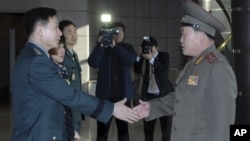The United States Wednesday called North Korea’s walkout of military talks with the South Koreans a "missed opportunity" for improving the political climate in the region. But U.S. officials say the outcome was not necessarily a collapse of dialogue efforts.
The breakdown of the military talks is being noted here with disappointment but not dismay, with State Department officials suggesting it may take multiple meetings to get a meaningful north-south dialogue going.
A two-day meeting of North and South Korean military officers at the Panmunjom border village ended with a North Korean walkout and no agreement on a date for a further meeting.
A South Korean official said the talks, the first of their kind in many months, had collapsed. But briefing reporters here, State Department Spokesman P.J. Crowley suggested it is too soon to declare an end to efforts to repair strained inter-Korean relations.
He said it was a lost chance by Pyongyang to show sincerity by, among other things, taking responsibility for the sinking of the South Korean warship Cheonan last year and the lethal shelling of South Korea’s Yeonpyeong island in November.
"We certainly do believe that North Korea has to take responsibility for its recent actions, whether it’s the sinking of the Cheonan, the shelling of Yeonpyeong, and then demonstrate that it is going to take affirmative steps to reduce tensions in the Korean Peninsula," said P.J. Crowley. "This was an opportunity to do that, and clearly having North Korea walking out puts it in the category of a missed opportunity."
North Korea had recently made conciliatory gestures toward the Seoul government, giving rise to hopes the military contacts might be a springboard to the resumption of Chinese-sponsored six-party talks to end Pyongyang’s nuclear program.
A senior State Department official who spoke to reporters said U.S. analysts were not surprised by the outcome in Panmunjom, and that it may require further meetings before, as he put it, "we get this dialogue to where it needs to be"
North Korea was the main issue at State Department talks Wednesday involving Japanese Foreign Ministry Director-General Shinsuke Sugiyama and U.S. officials including Assistant Secretary of State for East Asian and Pacific Affairs and Kurt Campbell, and North Korea envoy Stephen Bosworth.
In Seoul, the U.S. special envoy for North Korean human rights issues Robert King met with South Korean National Security Adviser Chun Yung-Wu and senior legislators.
A South Korean newspaper said North Korea had asked King, at New York meeting last month, for a resumption of U.S. food aid, and had pledged to again allow international monitors to assure its delivery to needy North Koreans.
Asked about the report, Spokesman Crowley said there were no current plans to restart the aid program, suspended two years ago, and that North Korea is aware of U.S. terms for a resumption.
US Calls North Korean Walkout 'Missed Opportunity'




